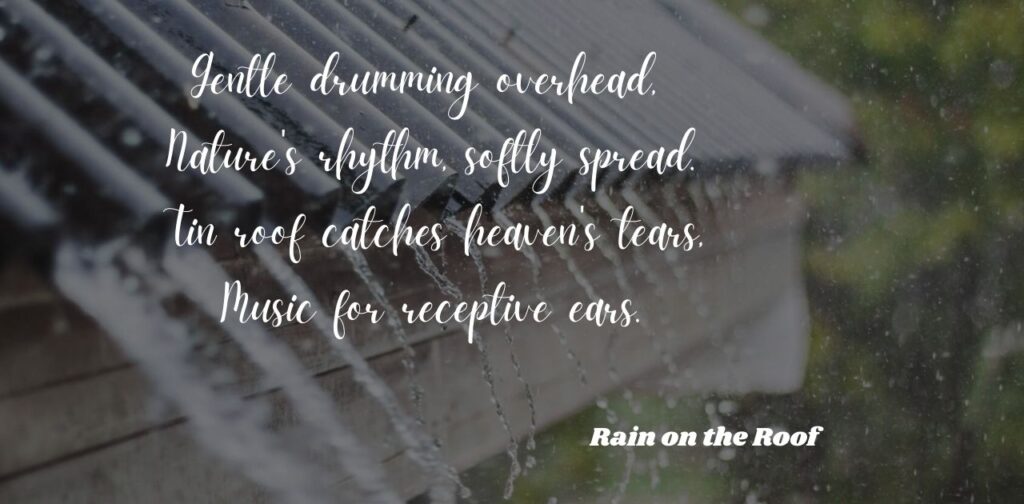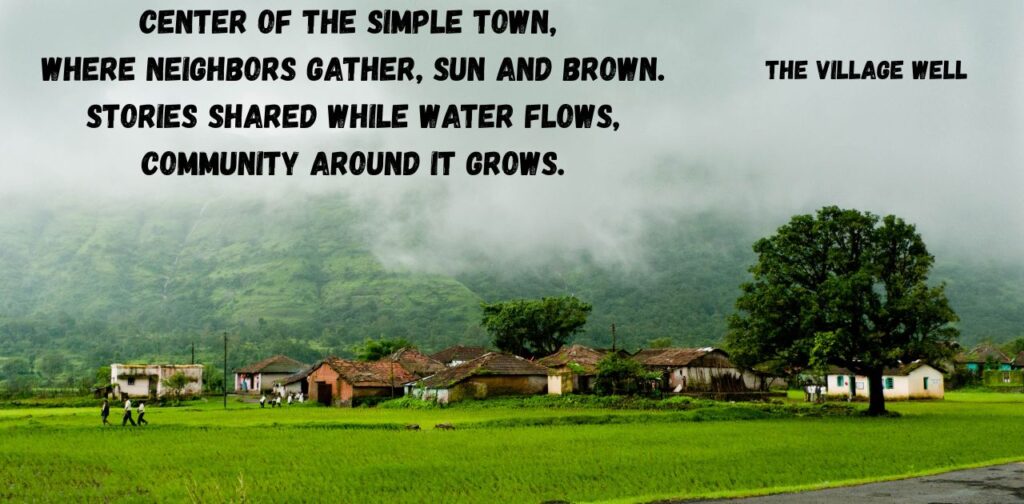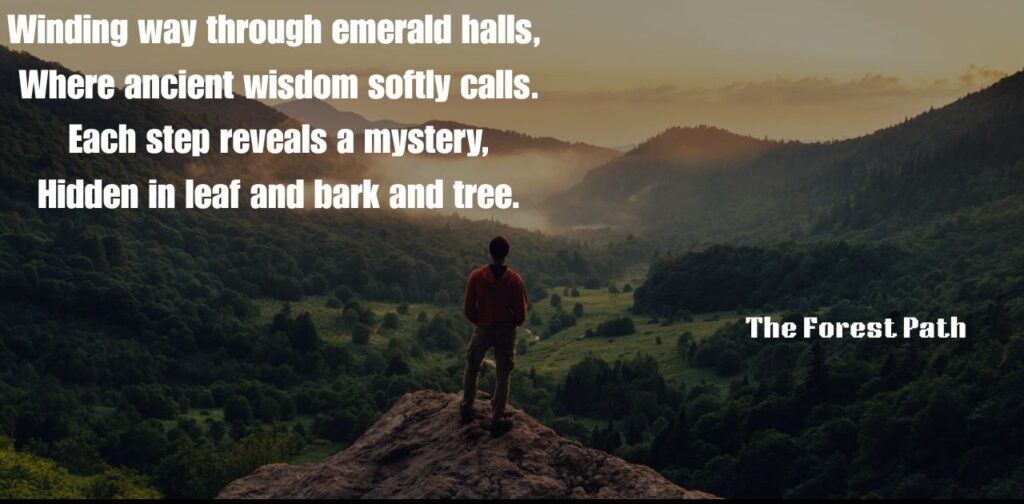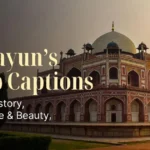Ruskin Bond’s short poems represent a treasure trove of literary artistry that captures the essence of India’s natural beauty and human emotions. These poems by Ruskin Bond offer readers intimate glimpses into the heart of one of India’s most cherished writers. His verse collection showcases the same gentle wisdom and profound connection to nature that has made his prose beloved across generations.
The Cherry Tree
A small seed planted with hope and care,
Grows into beauty beyond compare.
Through seasons harsh and weather wild,
Nature nurtures her precious child.
This Ruskin Bond short poem embodies his philosophy of patience and perseverance. The cherry tree serves as a metaphor for personal growth and the rewards of nurturing dreams despite adversity. Bond’s connection to his own cherry tree in Mussoorie becomes a universal symbol of hope, reflecting how small acts of faith can yield magnificent results over time.
Mountains and Rivers
Peaks that pierce the morning sky,
Rivers singing lullabies.
In their embrace, I find my peace,
Where worldly troubles finally cease.
The Himalayan landscape serves as Bond’s eternal muse in this evocative piece. His intimate knowledge of the Garhwal hills shines through every line, capturing the spiritual essence of mountain living. This poem reflects Bond’s deep-rooted belief that nature provides sanctuary from life’s complexities, offering readers a moment of tranquil escape through his carefully chosen imagery.
Monsoon Magic
Clouds gather thick like ancient tales,
Thunder drums through mountain trails.
Rain awakens sleeping earth,
Celebrating nature’s rebirth.
Bond’s monsoon poetry captures the transformative power of India’s life-giving rains. His years of experiencing the hill station monsoons firsthand bring authenticity to his descriptions of how precipitation changes the entire landscape. This poem demonstrates his ability to find magic in everyday weather patterns, turning seasonal observations into profound reflections on renewal and change.
More Posts:22+ Inspiring Poems About Mahatma Gandhi in English
The Old Oak Tree
Centuries stand in rings of bark,
Witness to light, keeper of dark.
Roots run deep through soil and stone,
Never truly stands alone.
The wisdom of ancient trees becomes a recurring theme in Bond’s nature poetry. His reverence for old-growth forests and their role as silent historians reflects his environmental consciousness. This piece showcases how Bond transforms simple botanical observations into philosophical meditations on longevity, interconnectedness, and the passage of time.
Dehra Dun Days

Litchi gardens, mango lanes,
Childhood laughter, monsoon rains.
Every corner holds a story,
Days of simple, quiet glory.
Nostalgia permeates this tribute to Bond’s formative years in Dehradun. His ability to distill complex emotions into accessible verse makes this poem particularly resonant for readers familiar with small-town Indian life. The piece captures the bittersweet nature of memory, celebrating innocence while acknowledging the inevitable passage of time that transforms familiar places into treasured recollections.
Song of the Whistling Thrush
In morning mist, a liquid note,
From feathered throat, pure music wrote.
No audience seeks this artist true,
Singing simply, as we should do.
Bond’s bird poetry reflects his keen observation skills and deep appreciation for avian life in the Himalayas. The whistling thrush becomes a symbol of authentic artistry—creating beauty without expectation of recognition. This poem encapsulates Bond’s philosophy about writing and creativity, suggesting that the purest art emerges from genuine passion rather than external validation.
Evening in the Hills
Golden light on cedar trees,
Whispers of the evening breeze.
Day surrenders to the night,
Painting shadows, soft and light.
The twilight hours in the mountains receive tender treatment in this atmospheric piece. Bond’s mastery of creating mood through imagery transforms a simple evening scene into something almost sacred. His use of gentle personification—day “surrendering” to night—demonstrates his ability to find profound meaning in natural transitions that most people might overlook.
The Rusty Nail
Forgotten thing in garden corner,
Once held planks as wood’s adorner.
Now feeds roses with iron’s gift,
Teaching how purposes can shift.
This philosophical poem exemplifies Bond’s talent for finding beauty in unexpected places. The transformation of a discarded object into something nurturing reflects his optimistic worldview. The poem suggests that everything has value and purpose, even when that purpose changes over time—a message particularly relevant in our throwaway culture.
Grandfather’s Garden
Marigolds and morning glory,
Every bloom tells its own story.
Hands that planted, long since gone,
But their love keeps growing on.
Family memories interweave with botanical imagery in this touching tribute to intergenerational love. Bond’s exploration of how gardens outlive their creators speaks to themes of legacy and continuity. The poem captures the way physical spaces can hold emotional significance, becoming repositories of love that transcend individual lifespans.
Rain on the Roof

Gentle drumming overhead,
Nature’s rhythm, softly spread.
Tin roof catches heaven’s tears,
Music for receptive ears.
The sensory experience of rainfall on metal roofing becomes a meditation on finding beauty in simple pleasures. Bond’s ability to transform everyday sounds into poetry reflects his heightened awareness of his environment. This piece celebrates the cozy intimacy of being sheltered while nature performs outside, capturing a universally comforting experience.
The Banyan Tree’s Secret
Aerial roots descend like prayers,
Ancient wisdom each branch declares.
Shelter given, stories kept,
Secrets in its shadow slept.
The mystical qualities of India’s most revered tree receive reverent treatment in this spiritual poem. Bond’s understanding of the banyan’s cultural significance in Indian tradition adds depth to his natural observation. The tree becomes a metaphor for wisdom, continuity, and the interconnectedness of all life—themes that resonate throughout Bond’s broader body of work.
Valley of Flowers
Carpet woven, nature’s loom,
Colors chase away all gloom.
Petals dance in mountain air,
Beauty beyond mortal care.
This celebration of Himalayan wildflowers showcases Bond’s ability to capture the overwhelming beauty of natural spectacles. His reference to the famous Valley of Flowers reflects his deep knowledge of regional geography and ecology. The poem transforms botanical abundance into emotional abundance, suggesting that exposure to natural beauty can heal spiritual emptiness.
More Posts:20+ Rhyming Poems on Nature in English
Winter Morning
Frost writes stories on the glass,
Silver narratives that pass.
Sun breaks through with golden pen,
Writing warmth on world again.
Seasonal poetry allows Bond to explore themes of renewal and change through natural metaphors. His personification of weather elements as writers and artists reveals his writerly perspective on the world around him. The poem captures the dramatic daily transformation that occurs during Himalayan winters, when frost and sun engage in their eternal creative dialogue.
The Leopard’s Call
Shadow moves through dappled night,
Hunter’s grace beyond our sight.
Wild heart beating free and strong,
Nature’s fierce, untamed song.
Bond’s wildlife poetry reflects his respect for the predatory animals that share his mountain environment. His portrayal of the leopard emphasizes beauty and wildness rather than fear, demonstrating his understanding that humans are guests in nature’s domain. The poem captures the mysterious allure of creatures that remain largely hidden from human observation.
Autumn Leaves
Gold and crimson, amber bright,
Dancing in October light.
Each leaf falls when its time comes,
To join earth’s eternal hums.
The cycle of seasons provides rich metaphorical material for exploring themes of mortality and acceptance. Bond’s treatment of autumn avoids melancholy, instead celebrating the natural progression of life. His observation that leaves fall “when their time comes” suggests a peaceful philosophy about life’s transitions and the beauty inherent in natural cycles.
The Village Well

Center of the simple town,
Where neighbors gather, sun and brown.
Stories shared while water flows,
Community around it grows.
Rural Indian life receives affectionate treatment in this poem about community gathering spaces. Bond’s appreciation for traditional social structures reflects his deep connection to village culture. The well becomes a symbol of how shared resources create shared bonds, suggesting that modern convenience sometimes comes at the cost of human connection.
Mist in the Valley
Ghostly veils on morning hills,
Mystery that daylight spills.
Shapes emerge and fade away,
In mist’s ethereal display.
The atmospheric conditions common in mountain valleys become material for exploring themes of mystery and revelation. Bond’s fascination with weather phenomena reflects his sensitivity to environmental changes and their emotional impact. The poem suggests that some of life’s most beautiful moments exist in the liminal spaces between clarity and obscurity.
The Postman’s Whistle
Bicycle bell and morning call,
Bringing news to one and all.
Letters carry hearts and dreams,
Connecting distant souls it seems.
This nostalgic tribute to pre-digital communication captures the romance of letter-writing that Bond experienced throughout his career. His appreciation for the postman’s role in connecting people reflects his understanding of how human relationships depend on communication. The poem celebrates the personal touch that physical letters provided, contrasting with today’s instant but often impersonal digital messages.
Himalayan Dawn
First light kisses sacred peaks,
Wonder that the heart still seeks.
Mountains wake in rosy glow,
Teaching all we need to know.
The spiritual dimension of mountain sunrise receives reverent treatment in this contemplative piece. Bond’s use of religious language—”sacred,” “wonder,” “teaching”—reflects his view of nature as a source of wisdom and revelation. The poem suggests that natural beauty has the power to provide answers to life’s deepest questions.
More Posts:17+ Sarojini Naidu Poems in English with Summary
The School Bell
Bronze voice calling, clear and true,
Summoning dreams both old and new.
Children running, books in hand,
Learning’s call across the land.
Educational themes appear throughout Bond’s work, reflecting his career as a teacher and his belief in learning as a lifelong journey. This poem captures the excitement and possibility that education represents, particularly for children in rural areas where schools provide gateways to broader opportunities.
Cricket in the Corner
Tiny musician, unseen band,
Plays concerts throughout the land.
No stage needed, no applause,
Music made without a cause.
Bond’s attention to small creatures demonstrates his appreciation for life in all its forms. The cricket becomes a symbol of pure artistic expression—creating beauty simply for the joy of creation. This poem reflects Bond’s philosophy that the best art emerges from authentic impulse rather than commercial consideration.
The Forest Path

Winding way through emerald halls,
Where ancient wisdom softly calls.
Each step reveals a mystery,
Hidden in leaf and bark and tree.
Forest imagery allows Bond to explore themes of journey and discovery. His portrayal of the woodland as a cathedral suggests the spiritual significance he finds in natural environments. The poem implies that nature provides guidance and revelation to those willing to venture beyond comfortable, familiar territories.
Summer Storm
Thunder rolls like giant drums,
Lightning writes, then quickly comes.
Rain arrives with urgent need,
Washing world and planting seed.
The dramatic power of mountain weather provides material for exploring themes of transformation and renewal. Bond’s personification of storm elements creates a sense of natural theater, suggesting that weather events serve purposes beyond mere meteorology. The poem celebrates the necessary disruption that storms bring to established patterns.
The Wooden Bridge
Planks that span the rushing stream,
Connecting shore to distant dream.
Each crossing tells a story new,
Of journeys brave and friendships true.
Symbolic imagery transforms a simple bridge into a metaphor for life’s transitions and connections. Bond’s appreciation for humble infrastructure reflects his understanding that small human interventions in the landscape often serve profound purposes. The poem suggests that bridges—literal and metaphorical—enable relationships and adventures that would otherwise remain impossible.
More Posts:28+ Ruskin Bond Poems for Class 5 and Class 7
Night Sounds
Owl calls pierce the velvet dark,
Fox pads leave no earthly mark.
Night reveals what daylight hides,
In darkness, different wisdom guides.
The nocturnal world receives careful attention in this atmospheric piece about nighttime awareness. Bond’s catalog of night sounds reflects his keen observational skills and his appreciation for the different rhythms that govern darkness. The poem suggests that night offers its own forms of knowledge, accessible only to those who remain alert to subtle sensory experiences.
Conclusion
These short poems by Ruskin Bond demonstrate his extraordinary ability to distill complex emotions and observations into accessible, memorable verse. His poetic legacy continues inspiring readers to find beauty in everyday moments and maintain deep connections with the natural world. Through these carefully crafted verses, Bond proves that profound wisdom often emerges from simple observations, creating timeless poetry that speaks to hearts across cultures and generations.

Admin of https://aspirenowa.com/. Sharing Touching and Thoughtful Poems for all Hearts. I Believe in Simple Words, Deep Meaning, and Inspiring Emotions through Poetry for Every Reader.










